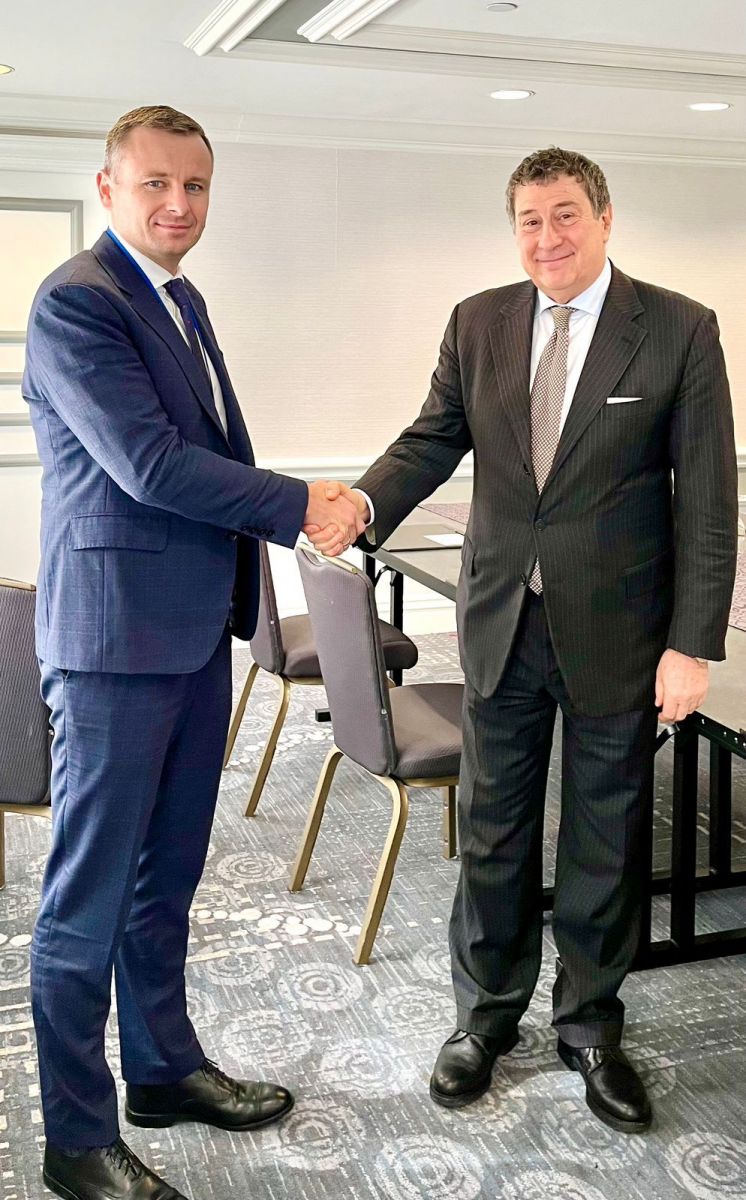Sergii Marchenko Met with Governor of the Council of Europe Development Bank
-
About Ministry
- Recruitment
-
Accountable agencies
- State Enterprises and Institutions Belonging to the Sphere of Management of the Ministry
- State Service for Financial Monitoring
- State Treasury
- The State Audit Service of Ukraine
- State Tax Service of Ukraine
- State Customs Service of Ukraine
- Personnel Audit Procedures of State Customs Service
- State Tax University
- Minfin Panel
-
Policy Issues
- Budget policy
- Tax Policy
-
Customs Policy
-
Customs Reform
- Common transit mode
- System of simplifications
- General declaration of arrival
- Authorized economic operators
- The only window for international trade
- Promoting the protection of intellectual property rights
- Qualification and reliability testing
- Functioning of the State Customs Service in the format of a single legal entity
-
Customs Reform
-
Accounting and Auditing
-
Accounting
-
Introduction of International Financial Reporting Standards
- Translation of international financial reporting standards of 2024
- Translation of international financial reporting standards of 2023
- Translation of the 2022 International Financial Reporting Standards and the Conceptual Framework for Financial Reporting
- Archive of translations
- Taxonomy
- Translation of technical publications
- General Clarifications (filled in after the preparation of the relevant letters of explanation)
- Accounting in Private Sector
- Accounting in the Public Sector
- Methodological Accounting Council under the Ministry of Finance of Ukraine (download a short description)
- IFRS Council under the Ministry of Finance of Ukraine (download a short description)
-
Introduction of International Financial Reporting Standards
- Auditing
-
Accounting
- Debt policy
- Financial Policy
- National income strategy
-
Financial Monitoring
- Statements and reports of international organizations
- Legislation
- International standards
- Methodological assistance (recommendations and explanations)
- Education, trainings and seminars
- Samples of drawing up a schematic representation of the ownership structure
- List of states (jurisdictions) that do not comply or improperly implement the recommendations of international and intergovernmental organizations involved in the field prevention and counteraction
- List of persons to whom sanctions have been applied
- List of terrorists
- Send a report on violation of the legislation in the field of prevention and counteraction to legalization (laundering) of proceeds from crime, terrorist financing and financing of proliferation of weapons of mass destruction
- Methodology for determining the ultimate beneficial owner by a legal entity
-
International Cooperation
- Partners
-
Cooperation in Attracting Financing from the International Financial Institutions
- Procedure for attracting funds of International Financial Institutions
- World Bank
- EBRD
- EIB
- Deutsche Gesellschaft für Internationale Zusammenarbeit (GIZ) GmbH
- KFW
- Register of Joint IFIs Projects at the Stage of Preparation and Implementation (information)
- International Technical Assistance (within the competence of the Ministry of Finance)
- Monitoring of international technical assistance projects
- Cooperation with the Development Partners
- International Tax Relations
- Development of Public Internal Financial Control (PIFC)
- Other Areas of Public Policy
-
Legislation
-
Regulatory Activity
- reports_on_the_effectiveness_of_regulatory_acts_2024
- The activity plan for the preparation of the regulatory acts draft 2024
- Schedule of measures to monitor the effectiveness of regulatory acts 2024
- reports_on_the_effectiveness_of_regulatory_acts_2023
- The activity plan for the preparation of the regulatory acts draft 2022
- Schedule of measures to monitor the effectiveness of regulatory acts 2023
- Reports on the effectiveness of regulatory acts 2022
- The activity plan for the preparation of the regulatory acts draft 2022
- Schedule of measures to monitor the effectiveness of regulatory acts 2022
- Reports on the effectiveness of regulatory acts 2020
- The activity plan for the preparation of the regulatory acts draft 2021
- Schedule of measures to monitor the effectiveness of regulatory acts 2021
- Reports on the effectiveness of regulatory acts 2020
- The activity plan for the preparation of the regulatory acts draft 2020
- Schedule of measures to monitor the effectiveness of regulatory acts 2020
- Reports on the effectiveness of regulatory acts 2019
- The activity plan for the preparation of the regulatory acts draft 2019
- Schedule of measures to monitor the effectiveness of regulatory acts 2019
- Reports on the effectiveness of regulatory acts 2018
- The activity plan for the preparation of the regulatory acts draft 2018
- Schedule of measures to monitor the effectiveness of regulatory acts 2018
- Reports on the effectiveness of regulatory acts 2017
- The activity plan for the preparation of the regulatory acts draft 2017
- Schedule of measures to monitor the effectiveness of regulatory acts 2017
- Reports on the effectiveness of regulatory acts 2016
- The activity plan for the preparation of the regulatory acts draft 2016
- Schedule of measures to monitor the effectiveness of regulatory acts 2016
- Reports on the effectiveness of regulatory acts 2015
- The activity plan for the preparation of the regulatory acts draft 2015
-
Draft Regulatory Acts Discussion
- Regulatory acts draft for discussion 2024
- Regulatory acts draft for discussion 2023
- Regulatory acts draft for discussion 2022
- Regulatory acts draft for discussion 2021
- Regulatory acts draft for discussion 2020
- Regulatory acts draft for discussion 2019
- Regulatory acts draft for discussion 2018
- Regulatory acts draft for discussion 2017
- Regulatory acts draft for discussion 2016
- Regulatory acts draft for discussion 2015
- Draft Legislation
-
Regulatory Activity
-
Data
- Cooperation with Civil Society
- Press Center
During a working visit to the IMF and the World Bank Annual Meetings, Minister of Finance of Ukraine Sergii Marchenko met with Governor of the Council of Europe Development Bank (CEB) Carlo Monticelli.
Deputy Minister of Finance Olga Zykova also took part in the meeting.
The parties discussed the procedure for Ukraine's accession to the Council of Europe Development Bank.
“Today, the support of international partners is extremely important for Ukraine. And we are pleased for the opportunity to join the Council of Europe Development Bank, considering the Bank's huge experience in implementing socially important projects”, said Sergii Marchenko.
During the conversation, the parties discussed the further procedural steps that should be taken by the Ukrainian side in order to become a member of the Bank.
In accordance with Ukraine's implementation of the Sustainable Development Goals and PACE Resolution "Humanitarian Consequences of the War in Ukraine", the Interagency Group on Ukraine's Membership in the CEB was created.
The goal is to provide housing for citizens of Ukraine, including internally displaced persons, and to facilitate the implementation of the state housing policy. The cooperation also includes the development of new financial and loan programs, the implementation of international investment projects, including for further crediting of IDPs.
Additional Information
The Council of Europe Development Bank is a multilateral financial institution with a social orientation. The CEB was created in 1956 with the aim of solving issues related to the socially oriented reintegration of refugees, displaced persons and migrants by European countries.
Membership in the Bank is open to all member states of the Council of Europe and European countries. Currently, the Bank's members include 40 member states of the Council of Europe, the Holy See and Kosovo.
The current activities of the CEB are divided by sectors: refugees and migrants, construction of social housing, improvement of living conditions, environmental protection, overcoming the consequences and prevention of natural disasters, education, health care, preservation of cultural heritage, public administration, support of small and medium businesses. The advantage of CEB is expertise in the areas of civil infrastructure construction, housing construction, education, and health care.

